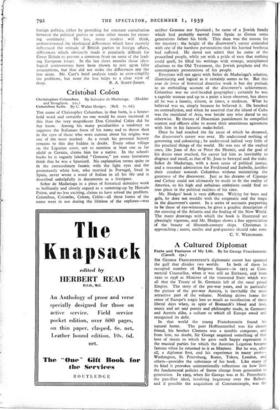CristObal ColOn
Columbus Sails. By C. Walter Hodges. (Bell. 7s. 6d.)
THE name of Christopher Columbus, in that form, is a house- hold word and certainly no one would be more incensed at this than the very magnificent Don Cristobal Colon did he but know. Among his many peculiarities a tendency to suppress the Italianate form of his name and to throw dust in the eyes of those who were curious about his origins was one of the most marked. As a result his personal history remains to this day hidden in doubt. Every other village on the Ligurian coast, not to mention at least one as far afield as Corsica, claims him for a native. In the school- books he is vaguely labelled " Genoese," yet some historians think that he was a Spaniard. No explanation seems quite to fit the extraordinary fanatic with the light eyes and the prematurely white hair, who married in Portugal, lived in Spain, never wrote a word of Italian in all his life -and is described =helpfully in documents as a fOreigner.
Senor de Madariaga in a piece of historical detective work as brilliantly and closely argued as a summing-up by Hercule Poirot, and no less exciting, claims to have solved the problem. Columbus, Colombo, Colom, Colon—all these forms of the name were in use during the lifetime of the explorer—was neither Genoese nor Spaniard ; he came of a Jewish family which had probably moved from Spain to Genoa some generatiOns before his birth. This then was the reason for the mystery: the height of the discoverer's career coincided with one of the harshest persecutions that his harried brethren had suffered. He dared not admit that he came of the proscribed people, while yet with a pride of race that nothing could quell, he filled his writings' with strange, unexplained allusions to the Old Testament, the Jewish prophets and the contemporary persecutions of his people.
Everyone will not agree with Senor de Madariaga's solution, illuminating and logical as it certainly seems to be. But this tour de force of historical detective work is but the prelude to an enthralling account of the discoverer's achievement. Columbus was no cool-headed geographer ; certainly he was a capable seaman and up to a point a keen observer, but above all he was a fanatic, almost, at times, a madman. What he believed was so, simply because he believed- it. He brooked no contradiction, and when he asserted that the island of Cuba was the mainland of Asia, woe betide any who dared to say otherwise. By threats of Draconian punishment he compelled seamen and officers alike to' assert their unanimous agreement
with him in his antestic make-belief. - Once he had reached the far coast of which he dreamed, the discoverer's career was over. He understood nothing of governing and,colonising ; he understood indeed very little of the practical things of the world. He was one of the exalted ones, like Joan of Arc or Peter the Hermit, and the goal of his desire once reached, his career led him as inevitably to disgrace and recall, as that of St. Joan to betrayal and the stake. Senor de Madariaga, with a keen sense of political justice, and a reasoned admiration for Ferdinand and Isabella, justifies their conduct towards Columbus without minimising the greatness of the discoverer. Just as his dreams of Cipango and Cathay could not ultimately be made to • fit the reality of America, so his high and nebulous ambitions could find no true place in the political realities of his time.
Mr. Hodges' book is very different. Writing for boys and girls, he does not meddle with the enigmatic and the tragic in the discoverer's career. In a series of accounts purporting to be those of eye-witnesses, he gives a graphic description of the crossing of the Atlantic and the finding of the New World. The many drawings with which the book is illustrated arc pleasingly vigorous, and Mr. Hodges shows a fine appreciation of the beauty of fifteenth-century ships. Christmas is approaching ; aunts, uncles and god-parents should take note.
C. V. WEDGWOOD.












































 Previous page
Previous page